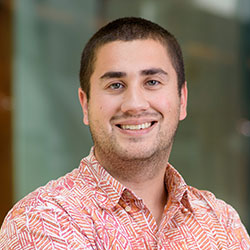Josiah Hester Receives Prestigious NSF CAREER Award
The award supports the development of battery-free devices with scientific and industrial applications
Northwestern Engineering’s Josiah Hester has received a Faculty Early Career Development Program (CAREER) award from the National Science Foundation (NSF), its most prestigious honor for junior faculty members.
 Hester is the Allen K. and Johnnie Cordell Breed Junior Professor of Design, an assistant professor of electrical and computer engineering and computer science at the McCormick School of Engineering, and (by courtesy) of preventive medicine at Northwestern’s Feinberg School of Medicine. He joined Northwestern in 2017 after earning his doctoral degree in computer science at Clemson University.
Hester is the Allen K. and Johnnie Cordell Breed Junior Professor of Design, an assistant professor of electrical and computer engineering and computer science at the McCormick School of Engineering, and (by courtesy) of preventive medicine at Northwestern’s Feinberg School of Medicine. He joined Northwestern in 2017 after earning his doctoral degree in computer science at Clemson University.
The CAREER program supports the early-career development of academic role models dedicated to outstanding research, inspired teaching, enthusiastic learning, and disseminating new knowledge to a broad audience. The award is intended to build a firm foundation for a lifetime of contributions to research, education, and their integration.
Hester will receive $631,000 over five years from NSF’s Division of Computer and Network Systems for his project titled “Enabling Dynamic, Adaptive, and Reliable Battery-free Embedded Computing.” The work — previously supported by an NSF Computer and Information Science and Engineering Research Initiation Initiative award — will focus on an emerging class of battery-free, embedded computing and sensing systems that operate using ambient energy from sources such as the sun, motion, radio waves, and vibration.
Hester and his team aim to explore and prototype scalable hardware platforms, adaptive software systems, high-level programming languages, and energy introspection tools that enable even novice developers to quickly prototype sophisticated battery-free applications, despite the frequent power failures from fluctuations in energy harvesting. Hester’s team will demonstrate high-performance applications in mobile smart health, habitat monitoring, and interactive devices to provide proof of approach and encourage the uptake of battery-free devices.
“Battery-free embedded systems offer a transformative and ecologically sustainable approach for building the next trillion computing devices,” Hester said. “The results of this research will impact fields across scientific and industrial interests including healthcare, ecology, horticulture, infrastructure, conservation, and public utility monitoring, and many other areas where long-term, massive scale sensing is essential. The hardware, systems, and tools will speed up research and commercialization in critical sectors like smart cities and the Internet of Things.”
Hester and collaborators at the McCormick School of Engineering developed the FaceBit — a new smart sensor platform for face masks that measures real-time respiration and heart rate, wear time, and quality of mask fit. The device is designed to harvest both solar power and energy from the user’s breathing and motion.
Hester and researchers from Delft University of Technology in the Netherlands pioneered a mobile video game console called Engage that resembles the 8-bit Nintendo Game Boy but runs off both solar power and mechanical energy harvested from pressing the buttons.
Sustainable, energy-efficient computing inspired by his Native Hawaiian (Kanaka maoli) heritage is the core of the work in the Ka Moamoa – Ubiquitous and Mobile Computing Lab directed by Hester.
The CAREER project includes an outreach and education component focused on increasing participation among Native Hawaiian youth in computing. Hester will partner with a public school and non-profit organizations to introduce Native Hawaiian students to computing concepts by building and demonstrating conservation-focused embedded systems applications.
“I'm truly honored that my research community considers this work on sustainable computing and batteryless devices worthy of a CAREER award,” Hester said. “I’m thrilled to continue working in this area with my students and colleagues.”
The honor is the latest for Hester, who was a recipient of the 2022 Daniel I. Linzer Award for Faculty Excellence in Diversity and Equity. Last year, he was named to the Brilliant 10 by Popular Science; received the American Indian Science and Engineering Society's Most Promising Engineer or Scientist Award; and also received the 3M Non-Tenured Faculty Award supporting outstanding early career faculty in STEM.